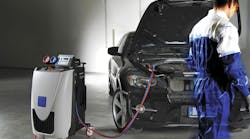Legislation was recently introduced in the Pennsylvania State Senate that strikes at the core of the Pennsylvania emissions inspection and maintenance program (I/M). State Senators Judith Ward (R-PA), Elder Vogel (R-PA), Patrick Stephano (R-PA) and Wayne Langerholc (R-PA) introduced five bills aimed at modifying the current Pennsylvania emissions I/M program. These bills were quickly moved through the Senate Committee on Transportation. One of the most egregious of the policy proposals is that “a subject vehicle shall be exempt from the requirements for emission inspection for eight years after the vehicle is manufactured.” According to PennDot, there are 5.9 million vehicles tested annually, of which 3.2 million are eight years old or newer.
Vehicle inspection and maintenance programs help improve air quality by identifying cars and truck with high emissions and that may need repairs. Owners or operators of vehicles with high emissions are notified to make any repairs so that emissions are within legal limits. The 1990 Amendments to the Clean Air Act (CAA) made I/M mandatory for several areas across the country. The Pennsylvania Department of Environmental Quality describes the value of the Pennsylvania I/M program: “Cars and light trucks are a major source of air pollution in Pennsylvania. Vehicle emissions contribute to health and environmental problems such as urban smog, air toxics, global warming and haze. All cars emit some pollution, but poorly maintained cars emit more. Visible smoke after a brief warm-up period indicates an engine malfunction, but most engine problems don’t produce pollution that you can see. Follow your owner’s manual for the recommended maintenance schedule. Not maintaining your car or ignoring your dashboard check engine light can cost you in future repair costs as well as pollute the air.”
There is an assumption by some that with new vehicle technologies there is no risk of harmful emissions. How many times do we get in a ride-share or taxi and note that the check engine light (CEL) is on?
In a memorandum to all Pennsylvania state senators, bill sponsors offered: “Vehicle emissions testing has become less effective at reducing air pollution, particularly due to newer, more fuel-efficient vehicles entering the fleet. There is also compelling evidence that vehicles are continuously passing the annual vehicle emissions testing. In Pennsylvania, between 2011-17, an average of 5.7 million vehicles were tested each year and an average of 96 percent of vehicles passed the test, which demonstrates annual vehicle emissions testing is ineffective and outdated. Although we are meeting or exceeding federal air quality standards and fewer vehicles are failing the emissions testing, there has not been any action in recent years to modernize the onerous, costly regulations of the I/M program.”
Since the implementation of the U.S. Environmental Protection Agency’s Clean Air Act Amendments of 1990, vehicle emissions inspection and maintenance programs have faced adversity. Programs initially struggled with whether programs should be centralized or decentralized, training issues, repair or so-called ping pong problems for consumers, etc. Philosophical concerns have spread to vehicle safety inspection programs too, i.e. consumer inconvenience, that programs such as these are a financial burden on consumers.
On its face, the Pennsylvania legislation’s exemptions and other proposed policies do harm to both consumers and small businesses. Most importantly, for this discussion, is the lack of stakeholder input. Similar to ill-planned shop licensing efforts in Houston, Texas or Obama Administration’s “Cash for Clunkers” economic stimulus efforts, not including stakeholders prevents good-decision making. Legislative or administrative bodies opt, at the beginning of the process, to make important decisions with limited information when stakeholders are not involved. This is high risk for positive outcomes. In the Pennsylvania case, a quick hearing, speedy legislative mark-up and fast-tracked legislation to the Senate floor proves harmful for Pennsylvania consumers and the automotive repair community.
Vehicle inspections are no different than a medical or dental check-off, not always convenient but important for maintenance. In the case of I/M, this issue is important for air quality and public health, not just in the State of Pennsylvania but for those communities outside Pennsylvania’s borders that inherit poorer air quality due to these types of proposed I/M program modifications.
The Pennsylvania I/M reform legislation should be stopped by House members.

